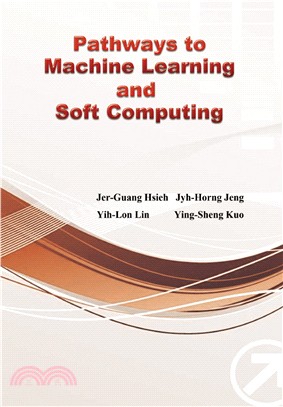Pathways to Machine Learning and Soft Computing
商品資訊
定價
:NT$ 570 元優惠價
:79 折 450 元
領券後再享89折起
領
團購優惠券A
8本以上且滿1500元
再享89折,單本省下50元
再享89折,單本省下50元
領
無庫存,下單後進貨(採購期約4~10個工作天)
可得紅利積點:13 點
相關商品
商品簡介
作者簡介
目次
商品簡介
This book provides frequently studied and used machines together with soft computing methods such as evolutionary computation. The main topics of the machine learning cover Artificial Neural Networks (ANNs), Radial Basis Function Networks (RBFNs), Fuzzy Neural Networks (FNNs), Support Vector Machines (SVMs), and Wilcoxon Learning Machines (WLMs). The soft computing methods include Genetic Algorithm (GA) and Particle Swarm Optimization (PSO).
The contents are basics of machine learning, including construction of models and derivation of learning algorithms. This book also provides lots of examples, figures, illustrations, tables, exercises, and the solution menu. In addition, the simulated and validated codes written in R are also provided for the user to learn the programming procedure when written in different programming languages. The R codes work correctly on many simulated datasets. So, the readers can verify their own codes by comparison. Reading this book will become strong.
One most important feature of this book is that we provide step by step illustrations for every algorithm, which is referred to as pre-pseudo codes. The pre-pseudo codes arrange complicated algorithms in the forms of mathematical equations, which are ready for programming using any languages. It means that students and engineers can easily implement the algorithms from the pre-pseudo codes even they do not fully understand the underlying ideas. On the other hand, implementing the pre-pseudo codes will help them to understand the ideas.
本書將介紹常用的機器學習(machine learning)方法以及軟計算(soft computing)如演化計算(evolutionary computation)等。主要的主題包括人工神經網路(Artificial Neural Network, ANN)、徑向函數網路 (Radial Basis Function Network, RBFN)、模糊神經網路 (Fuzzy Neural Network, FNN)、支撐向量機 (Support Vector Machine, SVM) 以及 Wilcoxon 學習機 (Wilcoxon Learning Machine, WLM)等。軟計算方面的主題則包括基因演算法 (Genetic Algorithm, GA) 和粒子群聚最佳化 (Particle Swarm Optimization, PSO)。
本書的重點是機器學習的基礎,包括模型的建立以及學習演算法的的推導。同時也提供許多的範例、圖示、表格、習題與解答。此外,針對所有演算法,本書提供使用 R 程式的實現和驗證,這些 R 程式都使用模擬資料驗證成功,讀者可以很容易使用其他的程式語言來實現,並且可以跟本書所附帶的 R 程式碼交叉驗證。讀完此書必然功力大增。
本書最重要的特色就是提供所有演算法的 Pre-Pseudo Code,也就是說,使用類似程式語言 Pseudo Code 方式,將數學公式以步驟的方式表達出來,非常簡易而且清楚,任何學生或工程師在還不完全了解演算法的情形之下,就可以根據所提供的 Pre-Pseudo Code 使用各種程式語言來實現;另一方面,讀者也可藉由這樣的實現方式來理解演算法的推導。
The contents are basics of machine learning, including construction of models and derivation of learning algorithms. This book also provides lots of examples, figures, illustrations, tables, exercises, and the solution menu. In addition, the simulated and validated codes written in R are also provided for the user to learn the programming procedure when written in different programming languages. The R codes work correctly on many simulated datasets. So, the readers can verify their own codes by comparison. Reading this book will become strong.
One most important feature of this book is that we provide step by step illustrations for every algorithm, which is referred to as pre-pseudo codes. The pre-pseudo codes arrange complicated algorithms in the forms of mathematical equations, which are ready for programming using any languages. It means that students and engineers can easily implement the algorithms from the pre-pseudo codes even they do not fully understand the underlying ideas. On the other hand, implementing the pre-pseudo codes will help them to understand the ideas.
本書將介紹常用的機器學習(machine learning)方法以及軟計算(soft computing)如演化計算(evolutionary computation)等。主要的主題包括人工神經網路(Artificial Neural Network, ANN)、徑向函數網路 (Radial Basis Function Network, RBFN)、模糊神經網路 (Fuzzy Neural Network, FNN)、支撐向量機 (Support Vector Machine, SVM) 以及 Wilcoxon 學習機 (Wilcoxon Learning Machine, WLM)等。軟計算方面的主題則包括基因演算法 (Genetic Algorithm, GA) 和粒子群聚最佳化 (Particle Swarm Optimization, PSO)。
本書的重點是機器學習的基礎,包括模型的建立以及學習演算法的的推導。同時也提供許多的範例、圖示、表格、習題與解答。此外,針對所有演算法,本書提供使用 R 程式的實現和驗證,這些 R 程式都使用模擬資料驗證成功,讀者可以很容易使用其他的程式語言來實現,並且可以跟本書所附帶的 R 程式碼交叉驗證。讀完此書必然功力大增。
本書最重要的特色就是提供所有演算法的 Pre-Pseudo Code,也就是說,使用類似程式語言 Pseudo Code 方式,將數學公式以步驟的方式表達出來,非常簡易而且清楚,任何學生或工程師在還不完全了解演算法的情形之下,就可以根據所提供的 Pre-Pseudo Code 使用各種程式語言來實現;另一方面,讀者也可藉由這樣的實現方式來理解演算法的推導。
作者簡介
Jer-Guang Hsieh received the Ph.D. degree in electrical engineering from Rensselaer Polytechnic Institute, Troy, New York, U.S.A., in 1985. He was with the Department of Electrical Engineering, National Sun Yat-Sen University, Kaohsiung, Taiwan, from 1985 to 2008. Currently, he is a Chair Professor at the Department of Electrical Engineering, I-Shou University, Kaohsiung, Taiwan. He is also a Chair Professor at the Department of Automatic Control Engineering, Feng Chia University, Taichung, Taiwan. Dr. Hsieh is the recipient of the 1983 Henry J. Nolte Memorial Prize of Rensselaer Polytechnic Institute. He won the Distinguished Teaching Award in 1988 and Best Prize for competition of the microcomputer design package for teaching and research in 1989, both from the Ministry of Education of the Republic of China. He won the Young Engineer Prize from the Chinese Engineers Association in 1994. He is a member of the Phi Tau Phi Scholastic Honor Society of the Republic of China and a violinist of Kaohsiung Chamber Orchestra. His current research interests are in the areas of nonlinear control, machine learning and soft computing, and differential games.
謝哲光於 1985 年 5 月獲得美國壬色列理工學院 (Rensselaer Polytechnic Institute) 電機博士。1985~2008 年任教於中山大學電機系。2008 年 8 月起擔任義守大學電機工程系講座教授,並於 2011年 8 月起擔任逢甲大學自動控制工程系特約講座。目前之研究興趣為非線性控制、機器學習與軟計算、及微分對局。
Jyh-Horng Jeng received the B.S. and M.S. degrees in mathematics from Tamkang University, Taiwan, in 1982 and 1984, respectively, and the Ph.D. degree in mathematics (Information Group) from The State University of New York at Buffalo (SUNY, Buffalo) in 1996. He was a Senior Research Engineer at the Chung Shan Institute of Science and Technology (CSIST), Taiwan, from 1984 to 1992. Currently, he is a Professor at the Department of Information Engineering, I-Shou University, Taiwan. His research interests include multimedia applications, AI, soft computing and machine learning.
鄭志宏於 1996 年 7 月獲得美國紐約州立大學水牛城分校 (State University of New York, SUNY, at Buffalo) 數學博士(資訊學群)。於1984~1992年間,曾任中山科學研究院技士。1996起擔任義守大學資訊工程系教授。其研究興趣為多媒體應用、人工智慧、機器學習與軟計算。
Yih-Lon Lin received the B.S. degree from the Department of Electronic Engineering, I-Shou University, Kaohsiung, Taiwan, in 1997 and the M.S. and Ph.D. degrees from the Department of Electrical Engineering, National Sun Yat-Sen University, Kaohsiung, Taiwan, in 1999 and 2006, respectively. Currently, he is an Associate Professor at the Department of Information Engineering, I-Shou University. His research interests include neural networks, fuzzy systems, and machine learning.
林義隆於 2007 年 1 月獲得國立中山大學電機工程系博士。2000~2007 年任教於遠東科技大學資訊管理系。2007 年 2 月起擔任義守大學資訊工程系助理教授,目前是義守大學資訊工程系副教授。近期著力於機器視覺、機器學習、影像處理、及人工智慧與醫學資訊應用。
Ying-Sheng Kuo received the B.S. degree in Mechanical Engineering from Feng Chia University, Taichung, Taiwan, in 1988 and the M.S. and Ph.D. degrees in Mechanical Engineering from National Cheng Kung University, Tainan, Taiwan, in 1991 and 1995, respectively. Currently, he is an Associate Professor at the General Education Center, Open University of Kaohsiung, Kaohsiung, Taiwan. His research interests include machine learning, soft computing, and computational fluid dynamics.
郭英勝於1995年6月獲得國立成功大學機械工程研究所博士。1998年起任教於高雄市立空中大學通識教育中心。目前之研究興趣為計算流體力學,機器學習與軟計算。
謝哲光於 1985 年 5 月獲得美國壬色列理工學院 (Rensselaer Polytechnic Institute) 電機博士。1985~2008 年任教於中山大學電機系。2008 年 8 月起擔任義守大學電機工程系講座教授,並於 2011年 8 月起擔任逢甲大學自動控制工程系特約講座。目前之研究興趣為非線性控制、機器學習與軟計算、及微分對局。
Jyh-Horng Jeng received the B.S. and M.S. degrees in mathematics from Tamkang University, Taiwan, in 1982 and 1984, respectively, and the Ph.D. degree in mathematics (Information Group) from The State University of New York at Buffalo (SUNY, Buffalo) in 1996. He was a Senior Research Engineer at the Chung Shan Institute of Science and Technology (CSIST), Taiwan, from 1984 to 1992. Currently, he is a Professor at the Department of Information Engineering, I-Shou University, Taiwan. His research interests include multimedia applications, AI, soft computing and machine learning.
鄭志宏於 1996 年 7 月獲得美國紐約州立大學水牛城分校 (State University of New York, SUNY, at Buffalo) 數學博士(資訊學群)。於1984~1992年間,曾任中山科學研究院技士。1996起擔任義守大學資訊工程系教授。其研究興趣為多媒體應用、人工智慧、機器學習與軟計算。
Yih-Lon Lin received the B.S. degree from the Department of Electronic Engineering, I-Shou University, Kaohsiung, Taiwan, in 1997 and the M.S. and Ph.D. degrees from the Department of Electrical Engineering, National Sun Yat-Sen University, Kaohsiung, Taiwan, in 1999 and 2006, respectively. Currently, he is an Associate Professor at the Department of Information Engineering, I-Shou University. His research interests include neural networks, fuzzy systems, and machine learning.
林義隆於 2007 年 1 月獲得國立中山大學電機工程系博士。2000~2007 年任教於遠東科技大學資訊管理系。2007 年 2 月起擔任義守大學資訊工程系助理教授,目前是義守大學資訊工程系副教授。近期著力於機器視覺、機器學習、影像處理、及人工智慧與醫學資訊應用。
Ying-Sheng Kuo received the B.S. degree in Mechanical Engineering from Feng Chia University, Taichung, Taiwan, in 1988 and the M.S. and Ph.D. degrees in Mechanical Engineering from National Cheng Kung University, Tainan, Taiwan, in 1991 and 1995, respectively. Currently, he is an Associate Professor at the General Education Center, Open University of Kaohsiung, Kaohsiung, Taiwan. His research interests include machine learning, soft computing, and computational fluid dynamics.
郭英勝於1995年6月獲得國立成功大學機械工程研究所博士。1998年起任教於高雄市立空中大學通識教育中心。目前之研究興趣為計算流體力學,機器學習與軟計算。
目次
About Author
About the Book
Table of Contents
Brief Sketch of the Contents
Chapter 1 Introduction
Chapter 2 Finite-dimensional Optimization
Chapter 3 Linear Classification
Chapter 4 Linear Regression
Chapter 5 Multi-layer Neural Networks
Chapter 6 Kernel-based Support Vector Classification and Regression
Chapter 7 Sequential Minimal Optimization Techniques
Chapter 8 Model Selection
Chapter 9 Wilcoxon Learning Machines
About the Book
Table of Contents
Brief Sketch of the Contents
Chapter 1 Introduction
Chapter 2 Finite-dimensional Optimization
Chapter 3 Linear Classification
Chapter 4 Linear Regression
Chapter 5 Multi-layer Neural Networks
Chapter 6 Kernel-based Support Vector Classification and Regression
Chapter 7 Sequential Minimal Optimization Techniques
Chapter 8 Model Selection
Chapter 9 Wilcoxon Learning Machines
主題書展
更多
主題書展
更多書展本週66折
您曾經瀏覽過的商品
購物須知
為了保護您的權益,「三民網路書店」提供會員七日商品鑑賞期(收到商品為起始日)。
若要辦理退貨,請在商品鑑賞期內寄回,且商品必須是全新狀態與完整包裝(商品、附件、發票、隨貨贈品等)否則恕不接受退貨。










































































